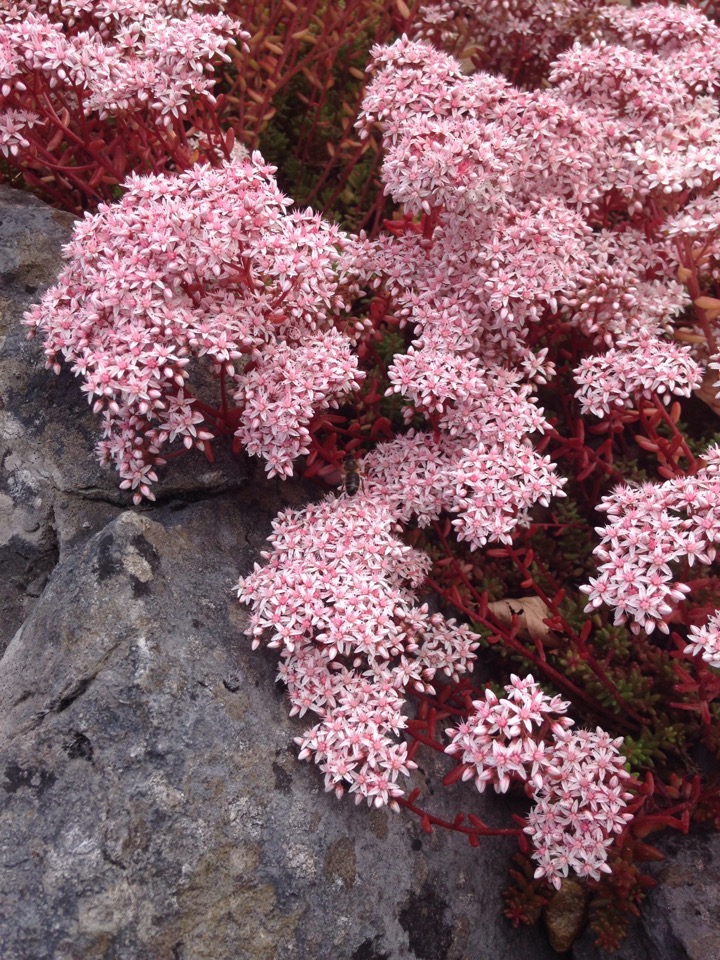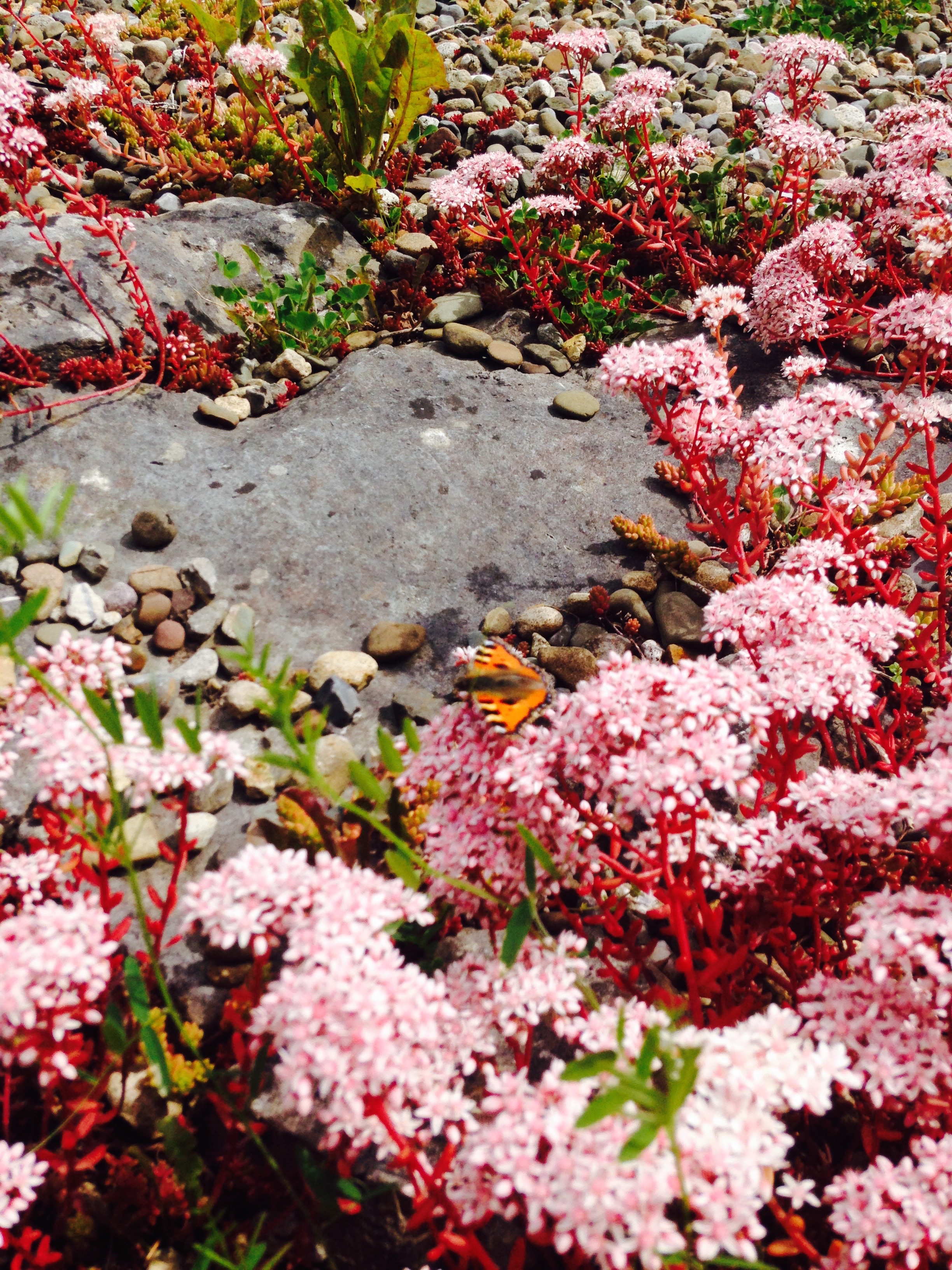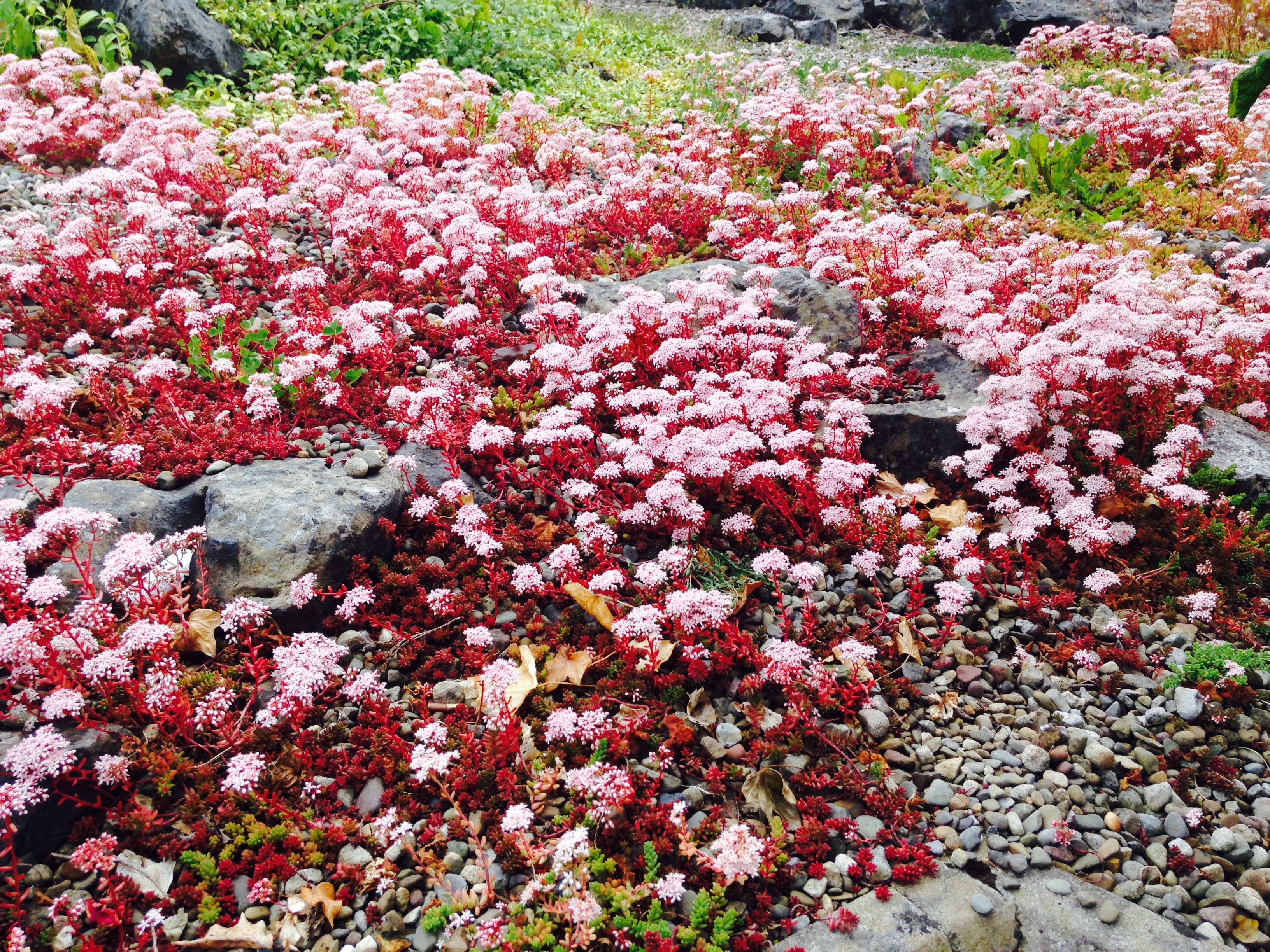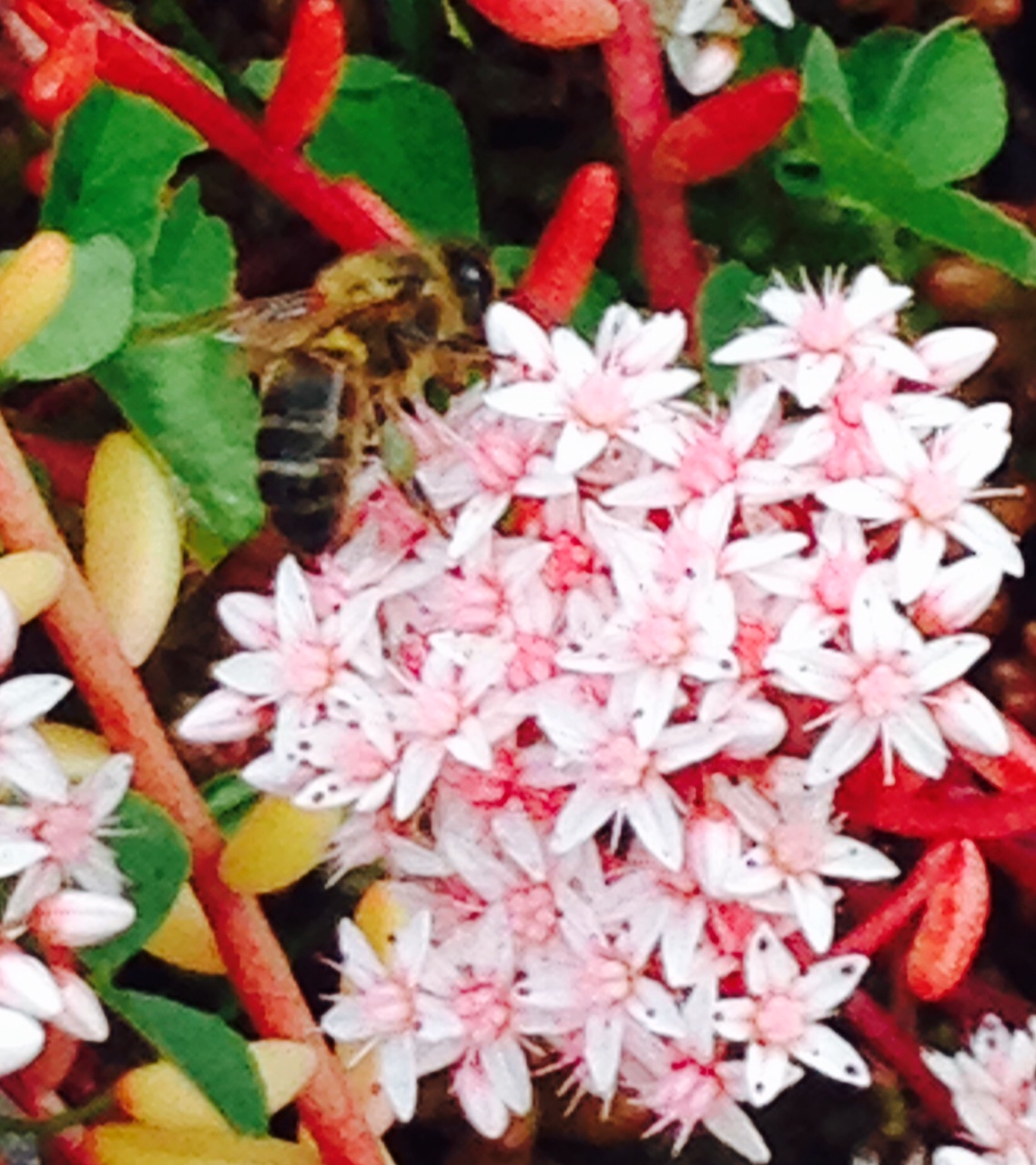Spot the Honey Bee!!!
-
Hi All,
Since I learned a few years ago of the dangerous situation that bees and butterflies are in worldwide, I'm always trying to make people more aware of our little friends. If they become extinct we will be in deep trouble.

My house plot is on a limestone karst https://en.wikipedia.org/wiki/Karst and when building I decided to have no grass only rockeries. There is one to the front and another to the side of the house.
I covered the areas with sandstone pea-gravel and just let the limestone outcrops protrude. I then filled in here and there with some low cover plants that are suited to acidic conditions. The only maintenance involved was a few days a year pulling weeds. I'm NOT a gardener!
Last year an invader took hold in the side rockery. I didn't know what it was and was about to uproot the 'weeds' but when I looked closer I noticed that there were a load of bees taking pollen from the little pinkish / white flowers. I left well enough alone and the little invader has now taken over most of the two rockeries.
I have identified the plant is Sedum Anglicum (English Sedum) https://en.wikipedia.org/wiki/Sedum_anglicum. In winter it becomes a nice low carpet of succulent green/gray plump leaves and in summer it comes alive with in sea of flowers with a multitude of visiting bees and the odd butterfly. Today I counted well over 80 bees and the odd butterfly all busy working away.

I'm leaving the 'invaded' alone and hope it helps the local bee population also the butterflies and other pollinators to continue working hard for us even though we appear to be doing our best to make them extinct.
Here in Ireland more than half of our bee species have undergone substantial declines in their numbers since 1980. The distribution of 42 species has declined by more than 50%!
Great efforts are being made my our National Biodiversity Data Centre http://www.biodiversityireland.ie/projects/irish-pollinator-initiative/ to raise awareness with novel approaches which should particularly appeal to kids and adults alike.

Plant something that bees and butterflies will like and enjoy watching them at work, it very relaxing

And please let me know how YOUR country's bee and bug populations are doing?
Mike
-
We've noticed the decline in the 5 years we've lived here (Cambs Fens). Although we've had plenty of open flowers for them we haven't seen a single honey bee this year. What we have are bumble bees, but few. I read the other day how to revive a tired bee with a little honey & the very next day I had the opportunity to save a bumble in just this way. It was amazing to watch him recover so fast.
-
Fiona, Its good to see folks interested in bees. I'm sure that bumble bee you revived is still thanking you!
I just had a quick look at the rockeries and there are plenty of visiting honey bees. Here is a picture of a bee I just took with my iPhone on zoom. Its a bit blurry but possible to make out the little pollen baskets!

It seems honey bees are fairly fussy when it comes to pollen and like chemical free flowers. The sedum that invaded my rockeries seems to be high on their list of plants. Check out Plants for Bees, here, http://www.drought-smart-plants.com/plants-for-bees.html#axzz3h0wf7hLQ It offers a good guide to suitable plants that don't need much care. -
Here is a bee related project by Chester Lee that is worth supporting
Colony Collapse Disorder is SOLVED with the Bee Pole!
https://www.kickstarter.com/projects/1497454442/colony-collapse-disorder-is-solved-with-the-bee-po -
Hi Mike
Having taken a course by a Canadian Bee expert Ted Leischner, in which he stressed that what we need to do is recognize the wild bee populations, and plant appropriate food sources for the specific times in which they are harvesting their food, I'm a Bee-liever.
He brought examples of quite a few of the wild bee species which exist where I live, and I really suggest that people have a look at the wild species in their area. This is for 2 reasons.- I know I have swatted many of them, mistaking them for flies. Learn to identify them. The leaf cutters, the ground dwellers, the too many to name.
- By enhancing habitat, and in some cases (like Mason Bees) you can promote colonies, and the benefits of this is of course pollination, which as Mike correctly points out, without which, we are... well toast.
Ted believes that wild bees are the future, because of the perfect storm that is so hard on honey bees. Don't give up on honey bees by any means, but learn about your wild bees.
There are nearly 500 varieties of wild bees in BC Canada where I live.
Have a look/see at your habitat. Learn to see, and appreciate them, and like me, quit flattening them with the newspaper.
Plan Bee
-
@dale said:
I'm a Bee-liever.
Very good Dale. Yes, recognising the various types of wild bee populations is key to helping them to continue helping us.
I'd really like to do a course in beekeeping if one was nearby. I must start searching around.
-
The plight of the humble bee is something we all need to look out for ways we can contribute. We have a lot of wood bee's here, the smaller solo living bee that will live alone in a small hole in the ground or in tree's. I was lucky enough to spot a humming bird moth ONCE in a friends garden but this has not been repeated sadly. If Monsanto et al get their way the only insects we see (or hear) will be mosquitos or horse flies.
As for reviving burnt out bees, a little sugar, dissolved in water and left on the thumbnail can be just as good. I used this last year and it does work, revived bee flew off after a few minutes thumb rest.
-
Bees seem to be doing ok here Down Under.
I understand that a lot of money is spent keeping the threats out of our country.....but it makes me wonder how vulnerable we are.
On Kangaroo Island off the coast of South Australia, we have what is believed to be the purest stock of Ligurian Bees on the planet.....I hope they can keep it that way !
For a brief history, here is a link > http://www.users.on.net/~hogbay/hogbay2.htm
-
[/quote][quote="Mike Amos":3e8dwvm5]The plight of the humble bee is something we all need to look out for ways we can contribute. We have a lot of wood bee's here, the smaller solo living bee that will live alone in a small hole in the ground or in tree's. I was lucky enough to spot a humming bird moth ONCE in a friends garden but this has not been repeated sadly. If Monsanto et al get their way the only insects we see (or hear) will be mosquitos or horse flies.
As for reviving burnt out bees, a little sugar, dissolved in water and left on the thumbnail can be just as good. I used this last year and it does work, revived bee flew off after a few minutes thumb rest.[/quote:3e8dwvm5]
Mike,
That's interesting. I must try that and have a bee land on the thumbnail and feed.
[quote="Gareth":3e8dwvm5]Bees seem to be doing ok here Down Under.
I understand that a lot of money is spent keeping the threats out of our country.....but it makes me wonder how vulnerable we are.
On Kangaroo Island off the coast of South Australia, we have what is believed to be the purest stock of Ligurian Bees on the planet.....I hope they can keep it that way !
<span>For a brief history, here is a link > <a href="http://www.users.on.net/~hogbay/hogbay2.htm" target="newWin">http://www.users.on.net/~hogbay/hogbay2.htm</a></span>[/quote:3e8dwvm5]
Gareth,
The Ozzies and Kiwis run a tight ship when it comes to keeping non indigenous animals and plants out. I hope they keep up their vigilence when it comes to bee killing chemicals.
Thanks for the link to the Ligurian Bee.
-
Regarding identifying bees - I confess I have no idea which is which or their proper names. However, I saw this in The Gaurdian today... very helpful. I shall also by buying the set of stamps as I occasionally collect & frame sets - so I'll have a handy reference in future.

Stinging indictment: poll reveals public ignorance about bees in the UK
As Royal Mail launches new bee stamp set, half of British people cannot name a single bee species – despite recognising the importance of the pollinators
the Guardian (www.theguardian.com)
-
You want one of these Mike!
How Flow Works
The Flow system is a whole new way of extracting honey from Langstroth-style European honeybee hives. Of course, you’ll still need to look after your bees, as the brood box stays the same and when it comes to taking care of bees, there’s much to learn. But the world-first Flow Frames have revolutionised the honey-extra

Flow Hive AU (www.honeyflow.com.au)
Advertisement







